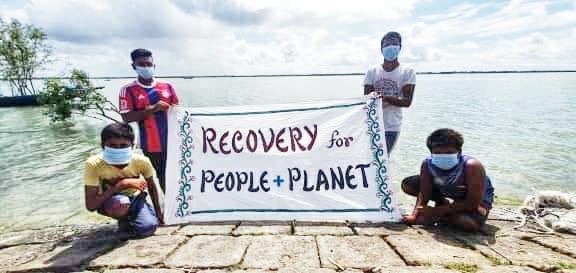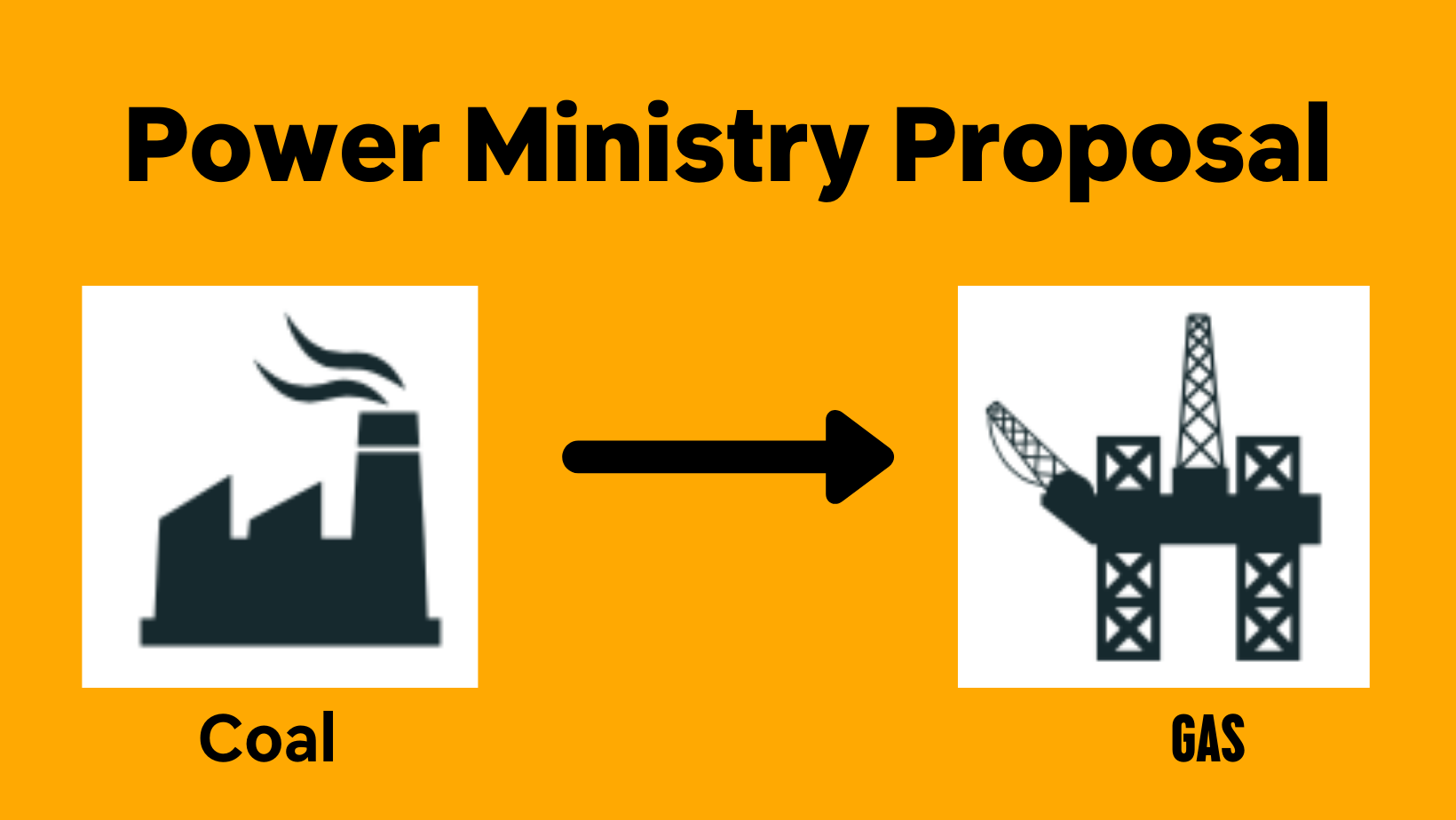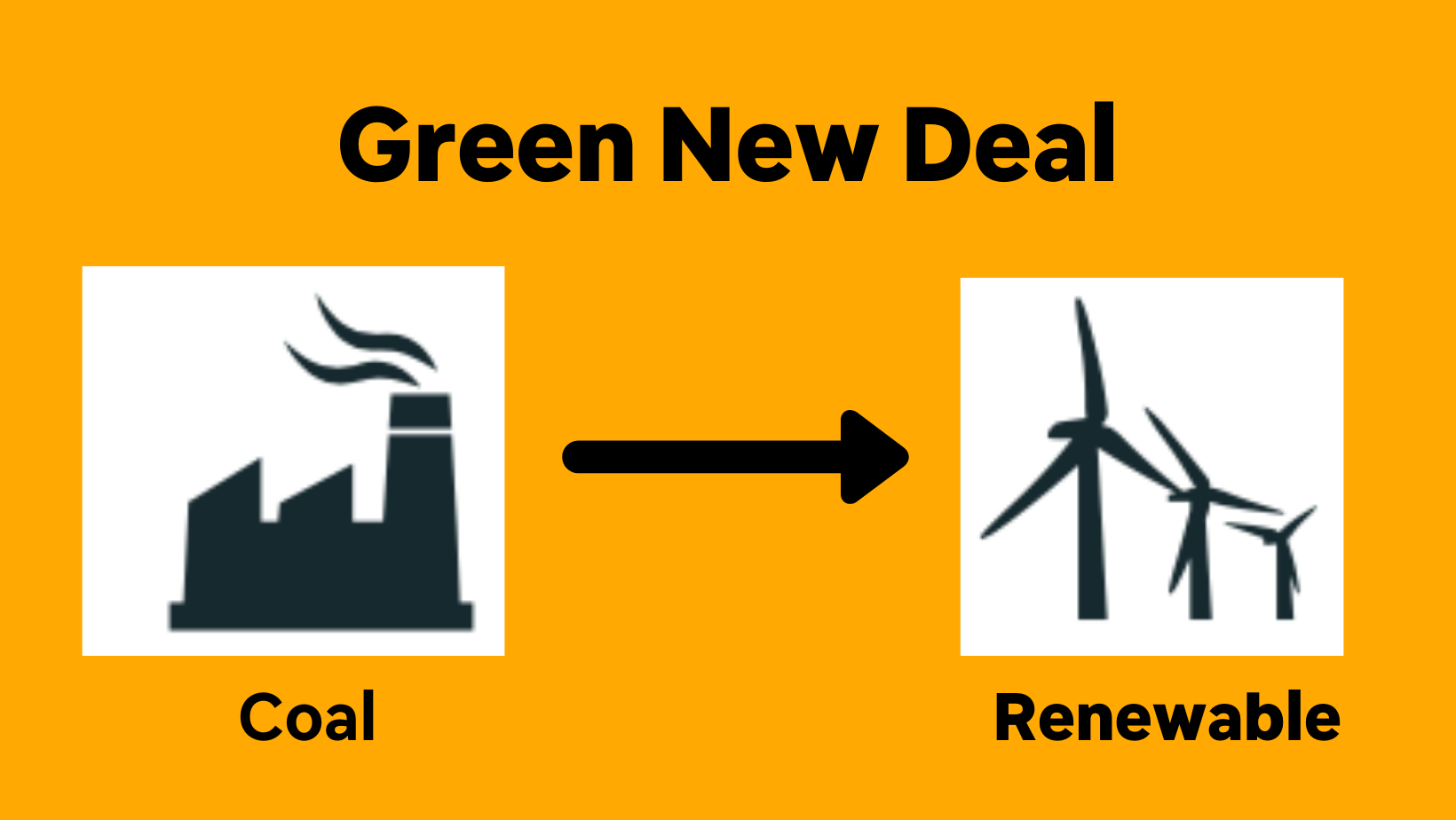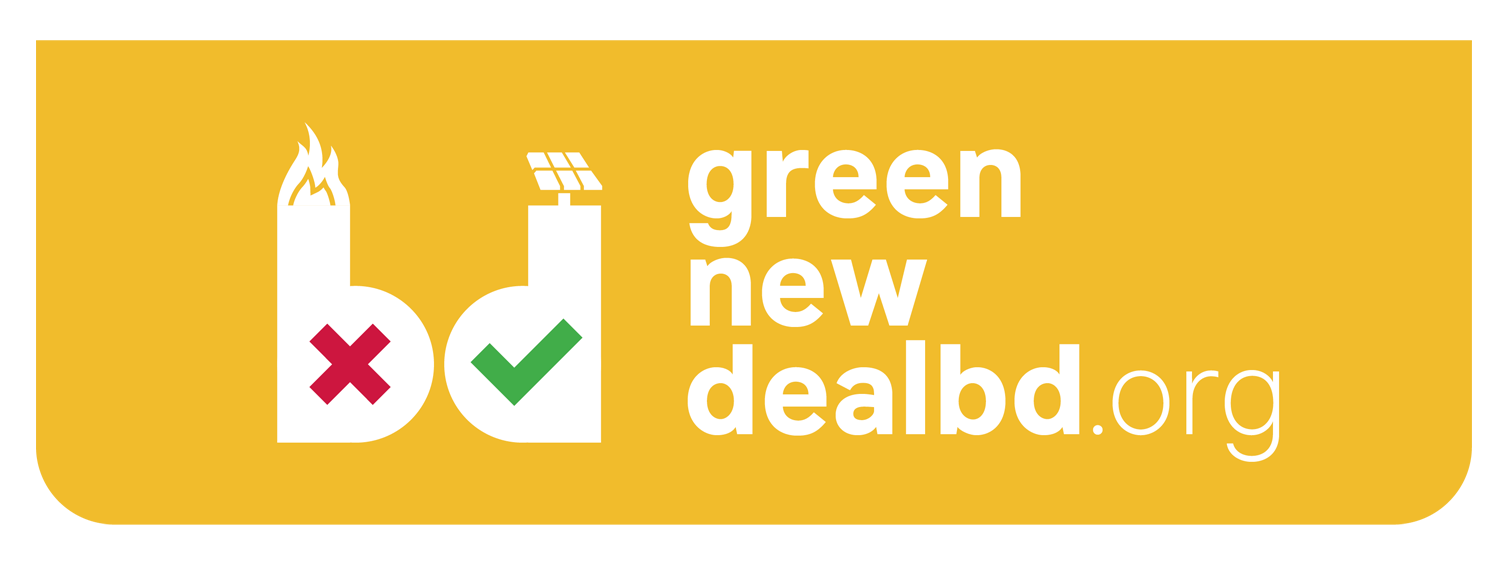Join the movement for a
Green New Deal
Bangladesh must keep coal and gas out of its energy transition plans and cancel all coal plant projects and use the land to kickstart new solar energy projects

A Green New Deal is a roadmap for a clean energy future for Bangladesh. It is a bold transformation for Bangladesh to tackle the twin crises of inequality and climate change.
A Green New Deal for Bangladesh must exclude Gas. It calls on the government to cancel all coal power plant projects and use the land to kickstart new solar energy projects so the country can move towards a 100% renewable energy system by 2050.
The Green New Deal for Bangladesh recognises that powering up the country, lifting people out of poverty, addressing the overcapacity problem in the energy system, and adopting a renewable energy pathway must go hand in hand. It honours the government’s provision to power more than 4 million households through solar technology systems and about 20 million people in rural areas in the last decade.
The Green New Deal campaign sees the recent proposal by the Energy Ministry to cancel coal plants as long overdue and a positive step toward a better power system for Bangladesh. But there are improvements that need to be made for this proposal to truly be beneficial. Switching from coal to LNG will keep the status quo. Emissions from natural gas are the same as coal. Instead of switching from coal to gas to renewable energy, Bangladesh can make a just transition to renewables right away.
As climate impacts in Bangladesh intensify, we can only rely on real climate solutions, and gas–a fossil fuel–is never a part of it. The government must revoke approvals of the proposed construction of new coal-plants or ones that have exceeded the contract period. Most of these coal plants will not be made by 2025. In order to reduce power and energy emissions to zero by 2050, we must transition to 100% renewable energy by shutting down all fossil fuel-based power plants.


It’s time for a Green New Deal
#GreenNewDealBD
Gas ‘Bridge Fuel’ Myth
Bangladesh should be mindful of LNG, because of the additional problems it would bring. If we consider the whole product cycle of gas, its emissions are the same as coal. Instead of switching from coal to gas to renewable energy, Bangladesh can make a just transition to renewables right away.
The bridge fuel myth is based on the inaccurate claim that only gas can affordably replace coal in the short to medium term. As climate impacts in Bangladesh intensify, it is clear that fossil fuels like gas are not a climate solution. Data shows that the greenhouse gas emissions just from burning the gas itself are enough to overshoot climate goals.
These five points make clear that gas is not clean, not cheap, and not necessary:
1.  Gas Breaks the Carbon Budget:
Gas Breaks the Carbon Budget:
Oil, gas, and coal in both current and under-construction extraction projects would take the world far beyond safe climate limits. Further development of untapped gas reserves is inconsistent with the climate goals in the Paris Agreement and will cause irreversible warming of the planet.
 2. Coal-to-Gas Switching Doesn’t Cut It:
2. Coal-to-Gas Switching Doesn’t Cut It:
Climate goals require the energy sector to be decarbonized by mid-century. This means that both coal and gas must be phased out. Replacing coal plants with new gas plants will not cut emissions enough, even if methane leakage (which is likely to happen) is kept to a minimum
3. Low-Cost Renewables Can Displace Coal and Gas: 
The dramatic and ongoing cost declines for wind and solar disrupt the business model for gas in the power sector. Wind and solar will play an increasing role in replacing retiring fossil fuel capacity and Bangladesh can get ahead of the game by investing in clean, just renewable energy.
 4. Gas Is Not Essential for Grid Reliability:
4. Gas Is Not Essential for Grid Reliability:
Wind and solar require grid balancing, but gas is not the only, nor the best, resource available to do so. Battery storage is fast becoming competitive with gas plants designed for this purpose. There is a wide range of technologies and solutions available to manage high levels of wind and solar on the grid. There is no reason to favor gas as the primary solution.
 5. New Gas Infrastructure Locks In Emissions:
5. New Gas Infrastructure Locks In Emissions:
Multibillion-dollar gas infrastructure built today is designed to operate for decades to come, locking in Bangladesh’s carbon emissions in financially unviable investments. Given the barriers to closing down infrastructure ahead of its expected economic lifespan, it is critical to stop building new infrastructure.
Bangladesh’s initial plan for coal and proposed transformation to LNG power will lead to “substantial overcapacity”. This means that the plants will reap less profit and lead to an increase in coal-generated electricity prices.
Source: Oil Change International
Overcapacity Problem
Increased overcapacity and a rise in associated capacity payments will increase the financial burden on BPDB and raise the likelihood of higher government subsidies or power tariffs for consumers.
Bangladesh will have power capacity to generate 58% more power than needed in 2029-30 if it proceeds with plans to add excessive coal- and LNG-fired power plants. Overcapacity would lead to significantly lower capacity utilisation of the new coal and LNG plants. These expensive assets would lie idle for much of the time, potentially receiving significant capacity payments while generating no power.
Bangladesh already has excess capacity that has entailed significant capacity payments to plants lying idle. Overall power capacity utilisation in 2018-19 was just 43%, while capacity payments to idle plants reached Tk90bn (US$1.1bn) in 2018-19. The current power capacity addition plan set out in the Revisited PSMP looks certain to lock in an extremely high level of overcapacity out to at least 2030.
The minister for power has stated that Covid-19’s impact on the economy will reduce demand and power revenues, and lead to even greater financial losses for the BPDB. Even before Covid-19, BPDB was making significant losses. In the fiscal year 2018-19, the government subsidy required to compensate BPDB for selling power below cost, and to avoid a major loss and cash flow shortfall, rose again to reach Tk80bn (US$936m). Before the Covid-19 pandemic struck, BPDB expected that the subsidy required in 2019-20 would rise again to Tk90bn (US$1.1bn).
A Renewable Energy Pathway for Bangladesh

A new solar energy plan drafted by the Sustainable and Renewable Energy Development Authority (SREDA ), offers a new pathway for Bangladesh’s renewable energy transformation. The draft plan recommends that the government steps up solar energy development to target 40,0000 (MW) by 2041.
A focus on renewable energy development in Bangladesh will slow down the rate of per megawatt capacity additions as solar power stations are smaller and modular relative to coal- and LNG-fired plants. This would help stop capacity additions running ahead of power demand growth.
Furthermore, solar power is still getting cheaper so it can help reduce the overall cost of generation. India has already benefited from its own focus on renewables deployment which has seen solar tariffs drop dramatically. The cost of batteries to store solar power is also dropping fast.
A major commitment to renewable energy in Bangladesh would see the same cost reductions occur, helping to reduce the need for power subsidies or tariff increases.
Along with a commitment to solar, a focus on power grid upgrades will also be required. This can help the power system support increased capacities of renewable energy and reduce transmission and distribution losses.
An improved power grid can also make better use of existing capacity by transmitting power from areas where power plants sit idle for much of the time to areas where increased supply is needed. This would also help address the overcapacity problem.
Instead of replacing the coal power projects with LNG, the Bangladesh government should consider using the land set aside for these projects for renewable energy installations. This could effectively jump-start Bangladesh’s utility-scale solar and wind power build-out and push down renewable energy tariffs.
Beyond this, there will be many other sites for solar development that SREDA has clearly identified in order to make its 40,000MW of solar recommendation feasible. This will surely include rooftop solar. According to SREDA, 12,000MW of this 30,000MW target is coming from rooftop solar.
Support Green New Deal in Bangladesh
In 2021, we have ambitious plans to build a movement for a Green New Deal in Bangladesh. We need your help in demanding the government to cancel all proposed and existing coal plant projects.
Together, we can push the country to move towards a 100% renewable energy system by 2050.
A Green New Deal For Bangladesh must exclude gas.

